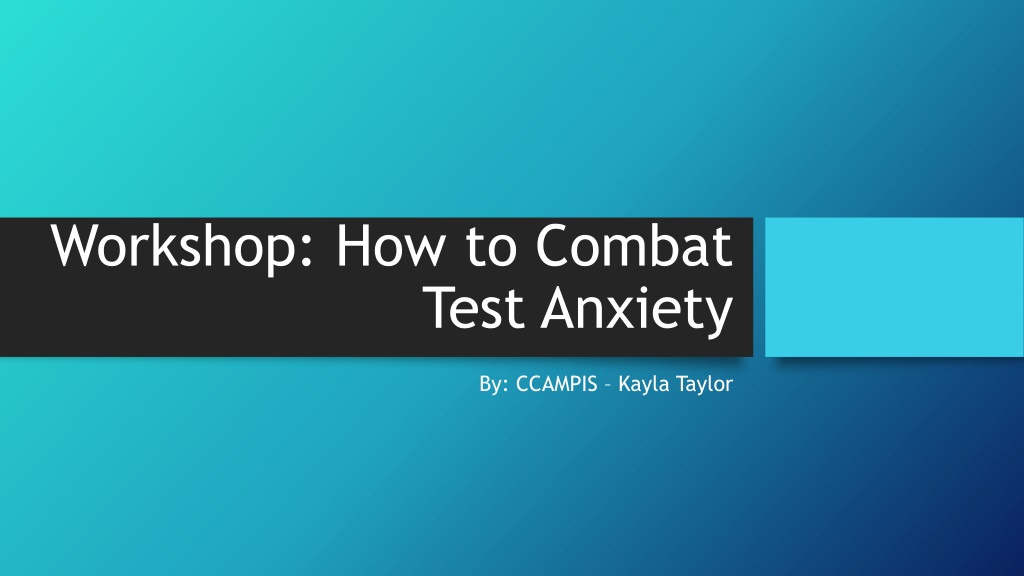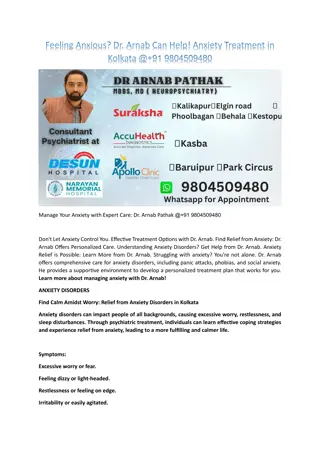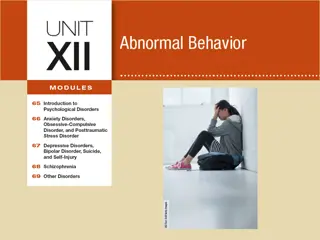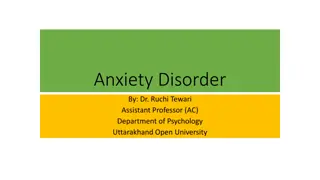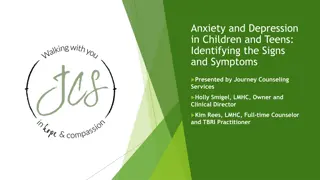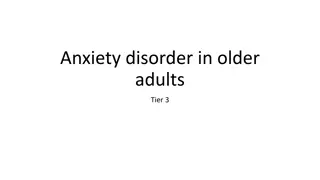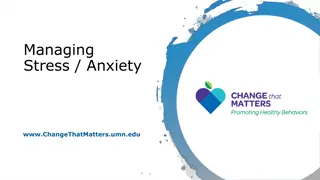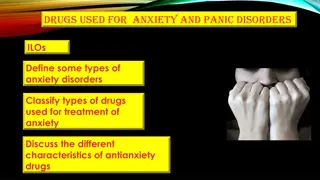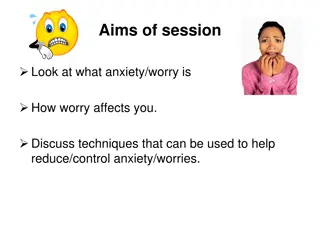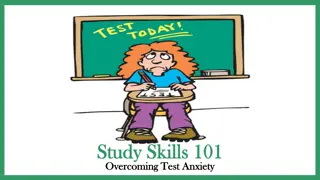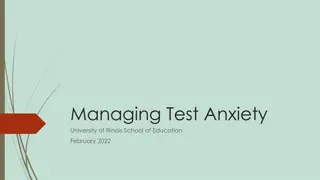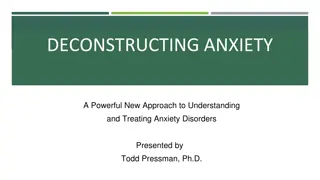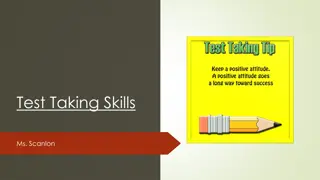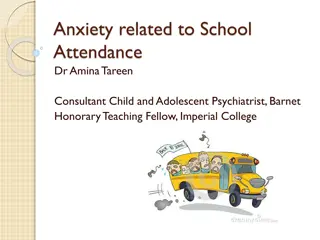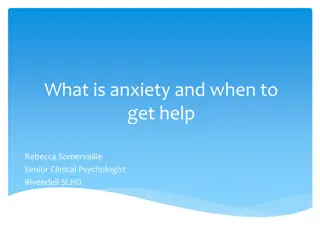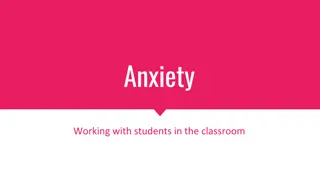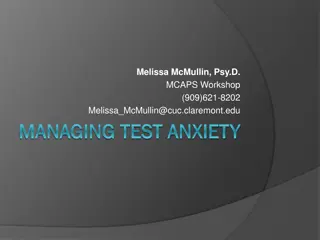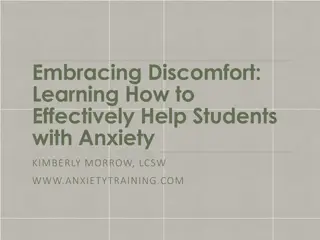Effective Strategies for Overcoming Test Anxiety
Learn practical methods to combat test anxiety in this 1-hour workshop by CCAMPIS Kayla Taylor. Topics covered include avoiding test anxiety, preparing effectively for tests, identifying and reducing sources of anxiety, quelling anxiety, test-taking strategies, and stress management. The PASS method - Preparation for Tests, Access Sources of Anxiety, Strategies for Test Taking, Stress Management - is highlighted. Discover how inadequate exam preparation contributes to test anxiety and explore tips for successful test preparation, including communicating with professors, joining study groups, practicing writing tests, and avoiding last-minute cramming. Access sources of anxiety by breaking the fear-avoidance cycle, identifying negative thoughts and unrealistic expectations. Take charge of your test anxiety to improve your test performance and overall well-being.
Download Presentation

Please find below an Image/Link to download the presentation.
The content on the website is provided AS IS for your information and personal use only. It may not be sold, licensed, or shared on other websites without obtaining consent from the author.If you encounter any issues during the download, it is possible that the publisher has removed the file from their server.
You are allowed to download the files provided on this website for personal or commercial use, subject to the condition that they are used lawfully. All files are the property of their respective owners.
The content on the website is provided AS IS for your information and personal use only. It may not be sold, licensed, or shared on other websites without obtaining consent from the author.
E N D
Presentation Transcript
Workshop: How to Combat Test Anxiety By: CCAMPIS Kayla Taylor
Title: How to Combat Test Anxiety Length: 1 Hour Supplies Needed: pencil, paper
Topics Covered Methods to avoid test anxiety How to prepare for tests How to find the sources of our anxiety and diminish them Methods for quelling anxiety Strategies for test-taking Methods for stress management
PASS Method Preparation for Tests Access Sources of Anxiety Strategies for Test Taking Stress Management
Preparation for Tests Test anxiety is caused in large part by inadequate or ineffective exam preparation. If you do not use effective study strategies, you will not have reviewed and understood the course information sufficiently to perform well on the test.
Methods for Test Preparation Talk to your professor. Ask for suggestions on how to study for their tests. Ask your professor what material will be covered on the test. Ask about the test format. Will it be essay, objective, fill-in-the-blank? Attend Supplemental Instruction (SI) or drop-in tutoring. Join a serious study group. Practice by writing and taking your own tests. Review your lecture notes daily. Clarify material you don t understand with your professor, study group, SI, or tutor. Review previous tests. Ask your professor if he/she makes previous tests available. The more you can know about what to expect on a test, the more prepared you will be and the less anxious you will feel. DO NOT CRAM for tests. Cramming is only minimally effective for getting good grades, but a GREAT way to increase your anxiety beyond control!
Access Sources of Anxiety Part of the problem with test anxiety is a vicious cycle of fear-avoidance-more fear. It is possible that at one time in your prior school experiences you performed poorly on a test. As a result, you became fearful of tests because they meant negative things like failure, ridicule, scolding, etc. To deal with your fear, you avoided tests, resulting in poor preparation, poor performance, and increased fear about tests ( I never do well on tests! ). Because of a few unfortunate experiences, you have built your anxiety to a level that almost ensures you will do poorly on tests. You must identify the sources of your test anxiety before you can begin to eliminate or reduce their power over you. The other major sources of test anxiety are your negative thoughts and unrealistic expectations.
Methods of Accessing Sources of Anxiety Mentally yell STOP! when worries or fears cause you to become anxious. Accept that you will feel anxious in a test. Accept that you will run into questions you can t answer, so there is no reason to get upset when it happens. Daydream before a test. Fill your mind with pleasant thoughts to push out the anxiety. Visualize before a test. Mentally rehearse what it will be like to succeed. Visualize taking the test successfully. Focus. If you can t answer a question, focus your thoughts on answering the next one, not on catastrophizing that you won t know the remaining questions. Praise yourself. Tell yourself I can do this. I m doing fine. One question at a time. This isn t as bad as I thought. Even if you don t totally believe what you re saying, your mind doesn t really know that. If you think more rational thoughts, you will automatically feel and act in more positive ways, despite your level of belief in what you say. The more you practice thinking rationally, the easier it becomes, and you will eventually believe it.
Strategies for Test-Taking Participate in tutoring sessions, which are offered for many General Education courses. Obtain Idea Sheets on Test-Taking from the Learning Resource Center. Take Student Success Strategies, where you learn test-taking and academic management skills. Ask your professor for suggestions on taking his/her tests. Work with your study group to find out what techniques they use to perform well on tests - then practice them using tests you create in your study group.
Methods for Controlling Your Anxiety before Test-Taking Come to the test early, with all materials necessary such as paper, blue book, scrantrons, plenty of writing utensils, etc. Take some time to relax, stretch, and breathe deeply. Listen to music that has a relaxing effect on you as you walk to class or wait in the classroom. Don t do last minute cramming or obsessing with classmates before a test. This is guaranteed to increase your anxiety and do little to substantially improve your test score. Wear comfortable clothing.
And Finally, Stress Management Practice stress management on a regular basis and before each tests. Stress management include relaxation techniques, good health habits, and positive self-talk.
Methods for Stress Management Get adequate sleep before a test. Cramming all night may get you through some tests, but in the long run is ineffective for adequate college performance. And, for some subjects, cramming just does not work to learn the material. Eat food with nutritional value, especially the day of an exam. Limit your intake of substances that tend to negatively affect your concentration. Do a ten-minute relaxation exercise before you leave for a test. This can be visualization, meditation, muscle relaxation, or deep breathing. If you run into a tough question during the test, close your eyes, breathe, and think to yourself, I can do this. Relax. and resume work. Focus on your work, not on what your classmates are doing. Even if some people are working faster than you, it doesn t mean they are more prepared. It could mean they don t know the answers and are just putting anything down.
Discussion How is your anxiety before exams? Do any of these tips seem helpful? What are some methods you use for test preparation? What are your opinions about the PASS Method? Do you think you ll be trying some of these methods out?
